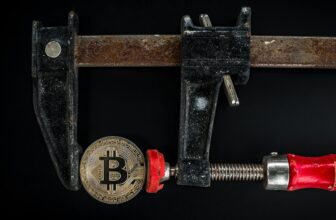
The best crypto cold wallet depends on various factors such as security features, usability, compatibility, and personal preferences. Some popular options include Ledger Nano X, Trezor Model T, KeepKey, Coldcard Wallet, and BitBox02. It’s crucial to research each option thoroughly and choose the one that aligns best with your needs.
What exactly are these cold wallets?
It holds the keys to your crypto kingdom. These little gadgets keep your private keys (think of them as the passwords to your crypto stash) offline, away from the prying eyes of hackers. No internet, no worries!
Choosing the right cold wallet is like picking the perfect hiking buddy – it depends on your style and needs. Here’s what to keep in mind:
- Security: This is kinda a no-brainer, right? You want a wallet that’s tougher than a Navy SEAL. Look for features like multi-factor authentication and tamper-proof hardware.
- Crypto Compatibility: Make sure your chosen wallet can hold the specific cryptos you own or plan to buy. Don’t be stuck with a wallet that only speaks Bitcoin when you’re a die-hard Dogecoin fan.
- Ease of Use: Tech-savvy wizard or just starting out? Choose a wallet that matches your comfort level. Some are super user-friendly, while others cater to the more adventurous types.
- Price: Cold wallets come in all shapes and sizes (and price tags). Consider how much crypto you have and how much you’re willing to spend on its security.
- Extra Features: Some wallets offer bonus perks like Bluetooth connectivity, staking options (think of it as earning interest on your crypto), or even fancy multi-signature support. Choose what tickles your crypto fancy!
The Top 15 Cold Crypto Wallets
Here are 15 popular options categorized based on their strengths to help you make an informed decision:
- Ledger Nano S Plus:
Affordable, secure chip design, beginner-friendly, supports many assets.
ledger-nano-s-plus - Trezor Model T:
Touchscreen and advanced features, Shamir backup, more expensive.
trezor-model-t - ELLIPAL Titan:
Extreme security, air-gapped transactions, self-destruct, expensive, requires technical knowledge.
ellipal-titan - KeepKey:
Multi-signature support, good value, fewer supported assets.
keepkey - Coldcard Mk4:
Open-source firmware, advanced security, not beginner-friendly, limited assets.
coldcard - Atomic Vault:
Affordable, basic security features, less user-friendly, limited assets.
atomicvaults - BitBox02:
Open-source, durable stainless steel build, fewer supported assets, less user-friendly.
bitbox02 - D’CENT:
Mobile-based, multi-signature, fingerprint authentication, requires phone pairing, fewer supported assets.
dcentwallet - Guarda Wallet:
Free (hardware option available), basic security features, limited hardware option features, fewer supported assets in free version.
guarda - SafePal S1:
Mobile wallet, fingerprint authentication, budget-friendly, fwer security features.
safepal - CoolWallet S:
Sleek design, Bluetooth connectivity, mobile app, plastic build, requires battery.
coolwallet - MetaMask Institutional:
Multi-user support, advanced key management, expensive, limited asset support.
metamask.io - Ledger Stax:
Modular for customization, staking capabilities, expensive, limited modules at launch.
ledger-stax - Ngrave ZERO:
Luxury design, touchscreen, biometric authentication, very expensive, limited asset support.
ngrave.io - Corazon Vault:
Biometric authentication, advanced security, expensive, limited information available.
CorazonVault
Remember, the “best” cold wallet depends on your individual needs and priorities. Consider factors like security, supported assets, budget, ease of use, and additional features before making your choice. Always conduct your own research and compare different options to find the perfect fit for you.
A table comparing features and specifications across different cold wallets:
| Feature | Ledger Nano S Plus | Trezor Model T | ELLIPAL Titan | KeepKey | Coldcard Mk4 |
|---|---|---|---|---|---|
| Price | ~$179 | ~$269 | ~$499 | ~$179 | ~$279 |
| Supported assets | 5,500+ | 2,000+ | 10,000+ | 2,000+ | 100+ |
| Security features | Chip + PIN, multi-factor authentication | Touchscreen + PIN, Shamir backup | Air-gapped transactions, self-destruct | PIN + recovery seed | Open-source firmware, no internet connection |
| Connectivity | USB / Bluetooth | USB / Touchscreen | Wi-Fi / Air-gapped | USB | USB |
| Ease of use | Beginner-friendly | Relatively easy | Requires more technical knowledge | Beginner-friendly | Advanced users |
| Multi-signature support | Yes | Yes | Yes | Yes | Yes |
| NFT support | Yes | Yes | Yes | Yes | Limited |
| Pros | Affordable, secure, supports many assets, beginner-friendly | Touchscreen, password manager, advanced features | Extreme security, air-gapped transactions | Multi-signature, PIN protection, good value | Open-source, advanced security |
| Cons | Plastic build, limited buttons | More expensive | Expensive, requires technical knowledge | Fewer supported assets | Limited NFT support |
Why Use a Cold Crypto Wallet? Unlocking the Benefits of Offline Security
Enhanced Security:
Imagine your crypto locked away in a physical vault, completely isolated from the internet. That’s the essence of a cold wallet. They store your private keys (think passwords to your crypto) offline, eliminating the risk of online threats like malware, phishing scams, and exchange hacks. This offline barrier provides an extra layer of security, giving you peace of mind knowing your crypto is safe even if your computer gets compromised.
Increased Control:
Unlike online wallets, where platforms may hold onto your private keys, cold wallets put you in complete control. You are the sole guardian of your crypto, responsible for safely storing and managing your private keys. This empowers you to make decisions without relying on third-party platforms, fostering self-reliance and financial independence.
Long-Term Storage:
Planning to HODL (hold on for dear life) your crypto for the long haul? Cold wallets are ideal for long-term storage. They are not susceptible to internet shutdowns or platform closures, ensuring your crypto remains accessible even if circumstances change. Additionally, some cold wallets are built to withstand physical damage like fire and water, adding another layer of protection for your precious holdings.
Support for Diverse Assets:
Gone are the days when cold wallets catered only to Bitcoin. Today, many wallets support a wide range of cryptocurrencies, stablecoins, altcoins, and even NFTs. This versatility allows you to store your entire digital portfolio in one secure location, simplifying your asset management and eliminating the need for multiple online accounts.
Peace of Mind:
Let’s face it, worrying about your crypto’s safety can be stressful. By implementing the robust security features of a cold wallet, you gain significant peace of mind knowing your investments are protected. This allows you to focus on the potential of your crypto holdings without constant concerns about online vulnerabilities.
What Cryptocurrencies Can You Store in Cold Wallets?
The range of cryptocurrencies you can store in a cold wallet has definitely expanded! While in the past, they might have mainly supported Bitcoin, now you can hold a diverse range of digital assets across many wallets. Here’s a breakdown:
Popular Coins:
- Bitcoin (BTC): The OG cryptocurrency thrives in most cold wallets.
- Ethereum (ETH): The second-largest coin finds a secure home in various cold wallets.
- Bitcoin Cash (BCH): Many wallets support this Bitcoin fork.
- Litecoin (LTC): This well-established altcoin is commonly accommodated.
- Ripple (XRP): Popular payment token often supported by cold wallets.
Stablecoins:
- Tether (USDT): This price-stable coin mimicking the US dollar finds its place in many wallets.
- USD Coin (USDC): Another prominent stablecoin pegged to the dollar, often supported.
- Binance USD (BUSD): Stablecoin backed by Binance, often supported by their hardware wallet and others.
Altcoins:
- Cardano (ADA): This smart contracts platform is supported by various cold wallets.
- Solana (SOL): This high-performance blockchain often finds support in modern wallets.
- Polkadot (DOT): This interoperable blockchain platform is increasingly supported by wallets.
- Chainlink (LINK): This popular oracle network token is often supported by advanced wallets.
Non-Fungible Tokens (NFTs):
- NFT-specific wallets: Some dedicated wallets like Ledger Vault and CoolWallet S support popular NFT standards and blockchains.
- Multi-asset wallets: Certain wallets like Trezor Model T and Guarda Wallet support specific NFT blockchains within their broader asset support.
Remember:
- Not all cold wallets support every cryptocurrency or NFT standard.
- Always check the individual wallet’s website for confirmed supported assets before choosing.
- New coins and NFT ecosystems are constantly emerging, so the supported asset list is continuously evolving.
Conclusion
The cryptocurrency landscape offers a plethora of cold wallets, each boasting unique features and security measures. While there’s no one-size-fits-all solution, understanding your priorities and desired level of security is crucial. This journey isn’t about crowning a single “best” wallet, but rather finding the one that best complements your needs.
Remember, security reigns supreme. Prioritize features like multi-factor authentication, tamper-proof hardware, and offline storage. Consider the range of assets you hold and plan to acquire, ensuring your chosen wallet accommodates them. User-friendliness shouldn’t be overlooked, especially for beginners. Finally, factor in your budget and any additional features that spark your interest.
By diligently researching and carefully weighing your options, you’ll unlock the peace of mind that comes with knowing your crypto investments are securely tucked away in your personal digital vault. So, venture forth, explore the exciting world of cold wallets, and find the perfect guardian for your crypto treasures!
References
The “best” crypto cold wallet due to individual needs, here are some reputable resources with detailed reviews and comparisons to help you choose:
Review Websites:
- Coin Bureau: https://www.youtube.com/watch?v=aUBid1zJC-U
- Crypto News: https://www.guru99.com/best-crypto-cold-wallets.html
- Techopedia: https://www.nerdwallet.com/article/investing/best-bitcoin-cryptocurrency-wallet
- Tom’s Hardware: https://cryptonews.com/guides/best-crypto-hardware-wallets.htm
- Finder: https://www.finder.com.au/cryptocurrency/wallets
Comparison Tools:
- CoinMarketCap: https://coinmarketcap.com/alexandria/article/323690b4-9b9e-42d4-8e40-fd0140d5a51b
- Luno: https://www.g2.com/products/luno/competitors/alternatives
Manufacturer Websites:
- Ledger: https://www.ledger.com/
- Trezor: https://trezor.io/
- ELLIPAL: https://www.ellipal.com/
- KeepKey: https://www.keepkey.com/
- CoolWallet: https://www.coolwallet.io/
FAQs
Q: What is the most secure cold crypto wallet?
Determining the most secure cold crypto wallet depends on various factors such as encryption methods, physical security features, and user authentication mechanisms. However, options like the Ledger Nano X and Trezor Model T are frequently praised for their robust security measures, including secure chip technology and PIN protection.
Q: Should I put my crypto in a cold wallet?
Storing your cryptocurrency in a cold wallet is generally considered one of the safest methods for long-term storage. Cold wallets keep your digital assets offline, away from potential hacking attempts and online vulnerabilities. If you’re not actively trading or using your cryptocurrency, transferring it to a cold wallet can provide added security and peace of mind.
Q: What is the most trusted crypto wallet?
The most trusted crypto wallet can vary depending on individual preferences and requirements. However, wallets like Ledger Nano X, Trezor Model T, and KeepKey are often recommended by the crypto community for their reliability, security features, and track record of protecting users’ digital assets.
Q: Is a cold wallet 100% safe?
While cold wallets are considered one of the safest options for storing cryptocurrency, it’s essential to understand that no storage method is entirely risk-free. Factors such as physical theft, loss of access to wallet credentials, or vulnerabilities in the wallet’s software could still pose potential risks. However, cold wallets significantly reduce the risk of online hacking and unauthorized access compared to hot wallets connected to the internet. It’s crucial to follow best security practices, such as keeping backups of wallet credentials and storing them securely, to mitigate potential risks.







